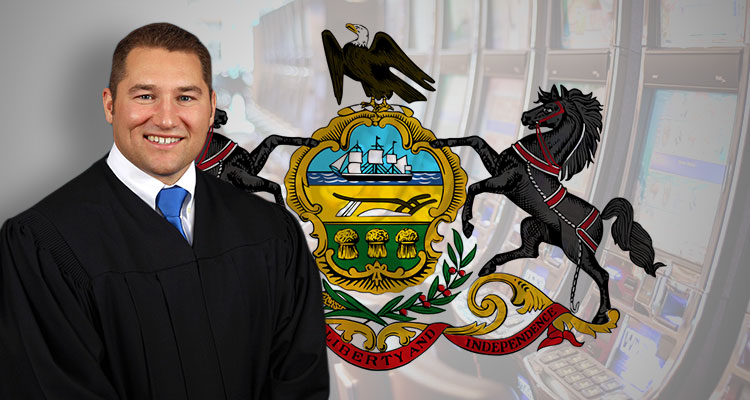Legislators in Pennsylvania are reportedly hoping that soon-to-appear legislation that would permit licensed liquor establishments, truck stops and off-track betting parlors to operate video gaming terminals has enough support to win over the American state’s casino operators and be ratified.
According to a report from the PennLive online news portal, the proposed bi-partisan legislation could generate as much as $100 million for the state in its first twelve months and up to $500 million annually after five years from the placing of as many as 40,000 of the slot-like video gaming terminals at locations across Pennsylvania.
“[The] Pennsylvania State Police estimates that over 40,000 illegal video gaming terminals are now operating in Pennsylvania and these illegal machines exist in an unlicensed, unregulated [and] untaxed platform,” Pennsylvania State Senator Guy Reschenthaler told PennLive.
The Republican is set to sponsor the as-yet-to-be-introduced legislation in the Pennsylvania State Senate and stated that the move was necessary in order to bring the illegal video gaming terminal market “out of the shadows”.
In the Pennsylvania House Of Representatives, Mark Mustio is to act as the main shepherd for the proposed measure and the Republican told PennLive that the coming legislation had been informed by past efforts to legalize video gaming terminals in Pennsylvania along with a visit to Illinois where these machines have co-existed with casinos since 2009.
“Illinois was a great pilot program for Pennsylvania to use when passing this legislation,” Mustio told the news portal before revealing that total gaming tax revenues in “The Land Of Lincoln” had increased by more than $2.1 billion in the three years since that state legalized non-casino video gaming terminals.
Mustio moreover pointed out that the legalization of casinos had not hurt lottery revenues in Pennsylvania as these had grown by $1.1 billion a year in the decade since the Mohegan Sun Pocono opened as the eastern state’s first in 2006 while he declared that he was hopeful the measure will be considered by the full Pennsylvania House Of Representatives as soon as possible.
For his part, Democratic governor Tom Wolf has previously reportedly indicated that he is receptive to the idea with some conditions, which could be helped by the current measure’s inclusion of steep penalties for those who continue to operate illegal machines encompassing confiscation, large fine and license revocation provisions.
“The governor is open to forms of revenue that are sustainable and will eliminate our structural deficit,” JJ Abbott, Press Secretary for Wolf, told PennLive. “The governor believes the solution should not be detrimental to existing gaming revenues from the lottery and other activities. He will continue to work with the general assembly to meet its commitment to enact gaming legislation while not causing harm to existing operations.”
As currently written, the proposed legislation would reportedly allow licensed liquor establishments to operate up to five video gaming terminals while Pennsylvania truck stops and off-track betting parlors would have their provision capped at ten. The maximum wager would be limited to $5 whereas a daily payout ceiling of $1,000 per machine would also be instituted. The measure would additionally bar anyone under the age of 21 from playing while key employees of establishments offering the machines would be required to undergo training.
“The local tavern owner is looking at this as another way to receive some revenues to help stay afloat and also contribute to the many endeavors we contribute to [including] churches, little leagues, all kinds of youth programs and stuff like that,” Jerry McCardle from the Pennsylvania Tavern Association told PennLive. “My consensus from the tavern owners that I have talked to is that if certain parts of this bill can be worked out, overwhelmingly the tavern owner is in favor of it.”
In a move designed to win the support of Pennsylvania’s casino operators, the proposed legislation also reportedly includes a provision that would lower the base tax on slots from 34% to 29% while setting the rate for the new video gaming terminals at 34% and mandate that these fresh operators pay a 4% local share tax, which would be divided evenly between host municipalities and counties.
PennLive reported that these sweeteners have been enough to gain the support of Penn National Gaming Incorporated, which runs the Hollywood Casino At Penn National Race Course near Harrisburg.
“Other casinos, the other eleven, are going to have to sit down with their business people and accountants too and run the math,” Eric Schippers, Public Affairs And Government Relations Senior Vice-President for Penn National Gaming Incorporated, told PennLive. “I can tell you [that] from our perspective, this bill in running that math does a good job of striking that balance between helping to mitigate [the cannibalization of casinos] and establishing a new industry in the commonwealth. Other companies will have to come to their own conclusion.”
However, Schippers was reportedly careful to stipulate that his firm’s support remains conditional on the proposed legislation remaining as currently written, which includes a provision that sees $2.5 million a year of the 34% video gaming terminal tax earmarked for firefighters and emergency services with an identical amount directed towards combating substance abuse.


